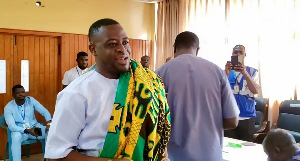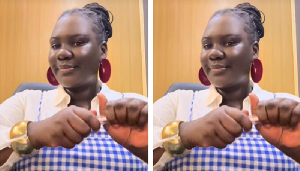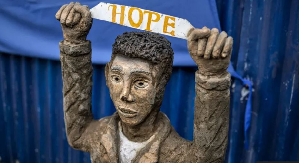....For water project in 3 Northern districts
The European Union (EU) is to spend ?92 billion on a project to improve water supply and sanitation facilities in three districts of the Northern Region.
Under the project, which is expected to be implemented over a four-year period, a total of 425 boreholes and 50 hand-dug wells as well as 2,050 sanitation facilities will be provided in the West Mamprusi, East and West Gonja districts.
The Minister of Finance, Mr Yaw Osafo-Maafo, announced this yesterday at a ceremony at which an agreement on the project was signed. Mr Osafo-Maafo signed on behalf of the Ghana Government whilst Mr Alessandro Mariani, Charge' d' Affaires of the European Commission, signed on behalf of the union.
Mr Osafo-Maafo recalled that in early 1999, the Northern Region, particularly East Gonja and the areas along the Volta River and its main tributaries, were by flooded. This, he said, caused damage to the already insufficient water supply infrastructure, making it possible for guinea worm, which was eradicated in some areas, to reappear. He said the project is therefore aimed at eradicating guinea worm infections and alleviating poverty in these areas.
Mr Osafo-Maafo urged all stakeholders in the project to work assiduously to ensure that the project is completed on time and said the signing of the agreement underscores the strong co-operation between Ghana and the EU. On his part, Mr Mariani said the funds for the project were provided by member states of the EU through the European Development Fund and added that the project is the union's contribution to the eradication of poverty, which is the overall objective of the EU development policy. He said 25 larger communities will receive a pipe distribution system with an elevated reservoir and a number of standpipes.
Mr Mariani said the pumps for those systems will be powered by solar energy. He said it is estimated that about 210,000 out of a total population of 576,000 will benefit from the project and stressed that the increase in access to water and sanitation facilities will reduce the prevalence of water-borne and related diseases of which guinea worm is the most endemic.
Mr Mariani said a beneficiary assessment study and regular evaluation will be made to accurately estimate the impact of the project. He said to ensure the sustainability of the project, an intensive training and mobilisation of the rural communities and district authorities is covered under the project. He said the communities will contribute 5 per cent of the capital investment costs and establish a Water and Sanitation Committee to see to the maintenance of the borehole, and the pipes and collect fees, which will be used to maintain the pipes.
Mr Mariani said the project will be implemented by the Community Water and Sanitation Agency (CWSA) and its regional office in Tamale.
General News of Tuesday, 27 February 2001
Source: GNA












